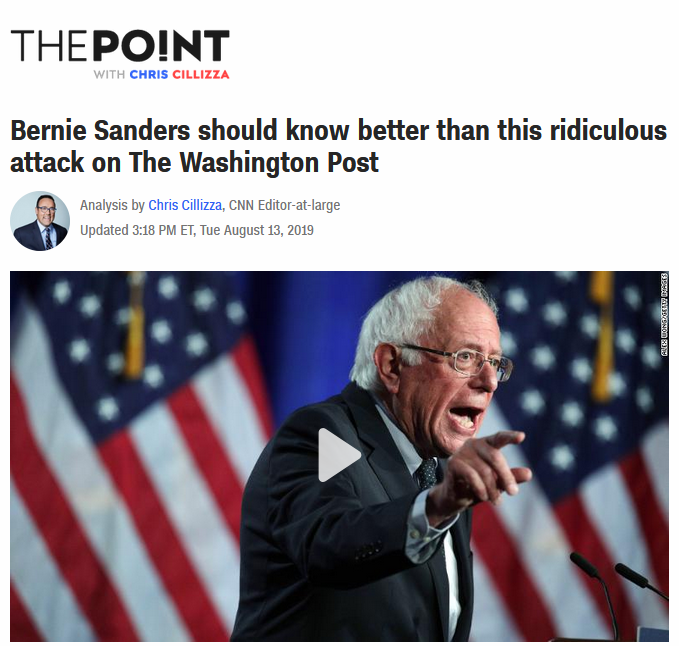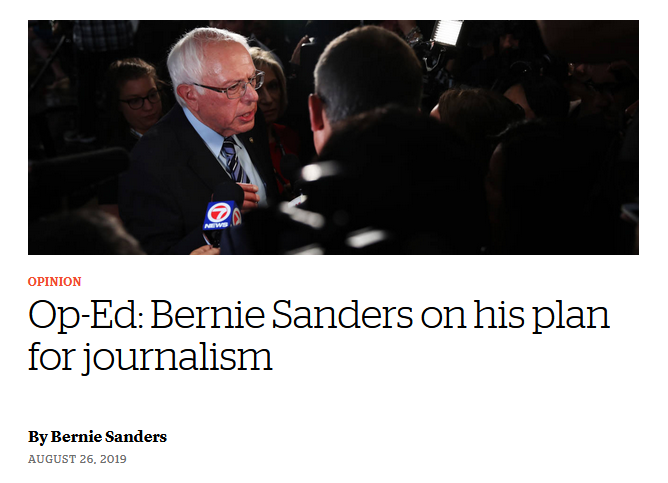Whenever corporate media discuss themselves, they frequently use scare quotes around the term “corporate media” (e.g., Washington Post, 10/24/19; Politico, 8/13/19), as if the term is referring to a nonexistent entity or a figment of their audience’s imagination. This is in stark contrast to their alarmist attitude towards foreign state media outlets like RT and Xinhua, which are frequently referred to as “propaganda” and “state media”—no quotation marks required ( New York Times, 3/8/17, 2/18/20).
Yet when they weren’t suggesting they were imaginary, corporate media were also fully capable on occasion of discussing their enormous impact on the race. Vanity Fair’s “Joe Biden, Revenant, Was an Irresistible Media Story—and It Helped Win Him Super Tuesday” ( 3/5/20) described how Biden campaign aides were gloating to CNN about riding their “earned-media tsunami” to victory in Super Tuesday—referring to coverage that wasn’t paid for following Biden’s South Carolina win—and estimated to be worth at least $72 million during those crucial days.
Despite noting that Sanders actually had more free coverage ($156 million) during this time period from the same “‘corporate media’” which had “written him off” earlier, Vanity Fair argued that media narratives trump any other factor (including money), with Sanders’ narrative being largely negative in contrast to Biden’s:
In recent days Biden has basked in mostly positive coverage, with TV pundits citing his South Carolina victory in arriving at a consensus narrative: Biden, despite poor showings in all of the early-primary states, is the comeback candidate peaking at the perfect moment.... Following Biden’s Saturday blowout, the media narrative shifted from Sanders being the momentum candidate to questions about whether his campaign was constrained by a ceiling due to his poor South Carolina performance, particularly with black voters, the most consistent Democratic voting bloc.
Corporate media frequently noted how Sanders has been their most frequent critic when he was on the campaign trail, and even when they grudgingly admitted its validity at times, they treated Sanders’ media criticism as an ideological perspective on the media, rather an uncontroversial description. Politico ( 8/13/19) wrote that “Sanders has long accused the ‘corporate media’ of putting the interests of the elite above those of the majority of Americans.” Vanity Fair ( 2/18/20) wrote: “Sanders has long contended that the agenda of ‘corporate media’ doesn’t necessarily reflect the people’s needs, and his 2020 campaign has doubled as a rolling media criticism shop.” The New York Times ( 3/5/20) also gaslit readers by attributing critique of the “‘corporate media,’” and MSNBC’s hosts for pushing an “‘establishment’” perspective, merely to Sanders and the “activist left,” as if their critique were only a sectarian complaint.
The Washington Post’s media critic Erik Wemple ( 10/24/19) mocked Sanders’ critique of the “‘corporate media,’” implying that Sanders hasn’t “done enough research” to “tease out tendencies,” despite writing that “attacking the ‘corporate media’ is good politics for Sanders, and his critiques sometimes land with heft and reason.” Post media columnist Margaret Sullivan ( 2/12/20) glancingly acknowledged media hostility towards Sanders when she observed that Sanders kept dissing “what he calls the corporate media,” and that his “ardent followers bond with him and with one another by despising the mainstream media, often enough with good reason”—yet she failed to explain this hostility in structural terms regarding media ownership and commercial interests. In the Post’s “Bernie Sanders’s Bogus Media Beef,” Aaron Blake ( 8/14/19) cited executive editor Marty Baron dismissing Sanders’ claims as a “conspiracy theory,” while the Post’s Paul Waldman ( 8/14/19) dismissed Sanders’ media criticism as “something in common with pretty much every candidate,” and breathtakingly asserted that “ ideological bias is usually the least important.”
Waldman’s assessment isn’t shared by FAIR ( Extra!, 10/89), or by Politico’s founding editor John Harris ( 11/7/19), who admitted that “the pervasive force shaping coverage of Washington and elections is what might be thought of as centrist bias, flowing from reporters and sources alike.”

Sanders' "ridiculous" claim, according to Chris Cillizza (CNN, 8/13/19), is that the owner of a media outlet has an impact on its viewpoint.
Another approach to dismissing structural media criticism has been to portray Sanders and Trump’s media criticisms as equally wacky conspiracy theories ( FAIR.org, 1/24/20). CNN’s Chris Cillizza ( 8/13/19) asserted that Sanders’ critique of the Jeff Bezos–owned Washington Post’s coverage is “absolutely no different than what Trump does.” Politico’s John Harris ( 2/13/20) bemoaned the “dilution of mainstream media’s institutional power” and pined for the days where editors at “major news institutions possessed enormous power” to “summon sustained national attention on subjects they deemed important” with their story selection and framing, while denouncing Sanders for following the “Trump precedent” in “taking flight from public accountability.”
When corporate media didn’t dismiss their bias against him, they sunnily described how Sanders didn’t seem to need fairer coverage from corporate media—and cable news in particular—because nonprofit media outlets, with considerably less resources and reach, are increasingly picking up the slack. Citing the “formidable” influence of “alternative media,” the Los Angeles Times ( 12/12/19) argued that “coverage in what Sanders likes to disparage as the ‘corporate media’ may matter less to him than to any of his rivals because of the benefit he derives from a surging alternative media ecosystem.” The New Republic ( 2/12/20, 2/28/20) acknowledged MSNBC’s hostile posture towards Sanders, yet also failed to explain that bias in terms of corporate interests, while arguing that Sanders’ campaign strategy of relying on an alternative media infrastructure to run “against the ‘corporate media’” and “withstand attacks from mainstream networks” has “worked wonders.”
Strikingly, in all these reports, corporate media either misrepresented Sanders’ proposed solutions to corporate media bias or omitted them altogether. Vermont journalist Paul Heintz ( Washington Post, 2/26/19), for example, chided Sanders for not understanding what a “free press” does, and claimed that Sanders’ remedy for corporate media is merely “uncritical, stenographic coverage of his agenda.”

Bernie Sanders (CJR, 8/26/19): "One reason we do not have enough real journalism in America right now is because many outlets are being gutted by the same forces of greed that are pillaging our economy."
In fact, Sanders’ op-ed in the Columbia Journalism Review ( 8/26/19) echoed many of FAIR’s criticisms of corporate media and proposed solutions:
Today, after decades of consolidation and deregulation, just a small handful of companies control almost everything you watch, read and download. Given that reality, we should not want even more of the free press to be put under the control of a handful of corporations and “benevolent” billionaires who can use their media empires to punish their critics and shield themselves from scrutiny....
In my administration, we are going to institute an immediate moratorium on approving mergers of major media corporations until we can better understand the true effect these transactions have on our democracy.... We must also explore new ways to empower media organizations to collectively bargain with these tech monopolies, and we should consider taxing targeted ads and using the revenue to fund nonprofit civic-minded media.
Setting aside the interlocking commercial interests mass media corporations share with other industries and advertisers funding their coverage ( FAIR.org, 8/1/17), just as one can expect the healthcare and fossil fuel industries to launch propaganda campaigns to protect their profits ( Intercept, 11/20/18; Guardian, 10/23/19), one can reliably predict these same media corporations to oppose any political agenda that harms their own profitability. Given Sanders’ opposition to future mergers and corporate consolidation of mass media giants, proposals to wield antitrust legislation against Google and Facebook, and levying new taxes to fund nonprofit media outlets, is it any surprise that for-profit news sources opposed his candidacy ( Politico, 8/28/19)?
Perhaps future media criticism might sound less “conspiratorial” if we simply referred to outlets like MSNBC as “ Comcast,” CNN as “ AT&T” and the Washington Post as “Jeff Bezos” instead. When one understands corporate media as an industry in themselves, decisions to have a centrist bias to maximize profits by appealing to liberals and conservatives alike, or creating “ information silos” to sell the news as a commodity to target demographics, make a lot more sense. And when we understand the news industry as a top-down institution, beholden to stockholders like all other corporations, we can stop blaming journalists for bad coverage, and start blaming executives like Les Moonves and Tony Maddox for doing things like gifting billions of dollars in free coverage for Trump ( FAIR.org, 3/31/20, 4/13/20).
Then maybe claiming that corporate media outlets like MSNBC and CNN are hostile to left-wing political agendas will be considered just as obvious as saying that ExxonMobil and Cigna are opposed to climate action and universal healthcare.
Featured image: New York Times (2/26/20) depiction of Joe Biden addressing reporters (photo: Brittainy Newman).
|



 espite pushback from public health experts, local employers, mayors, and even Fox News, Georgia governor Brian Kemp has announced that some businesses in his state will begin to reopen tomorrow, and Tennessee, Ohio, and South Carolina will follow soon after. What’s the benefit to a governor like Kemp in making this decision now?
espite pushback from public health experts, local employers, mayors, and even Fox News, Georgia governor Brian Kemp has announced that some businesses in his state will begin to reopen tomorrow, and Tennessee, Ohio, and South Carolina will follow soon after. What’s the benefit to a governor like Kemp in making this decision now?